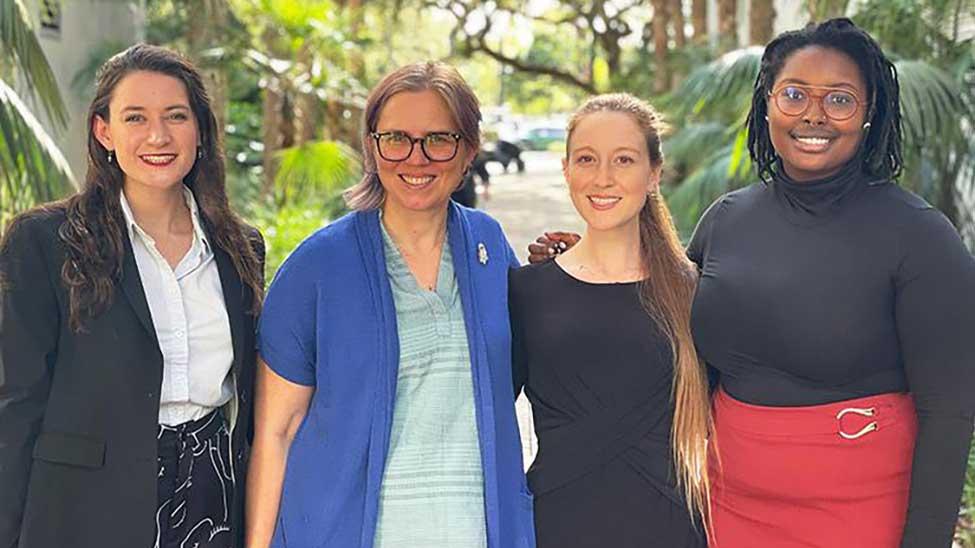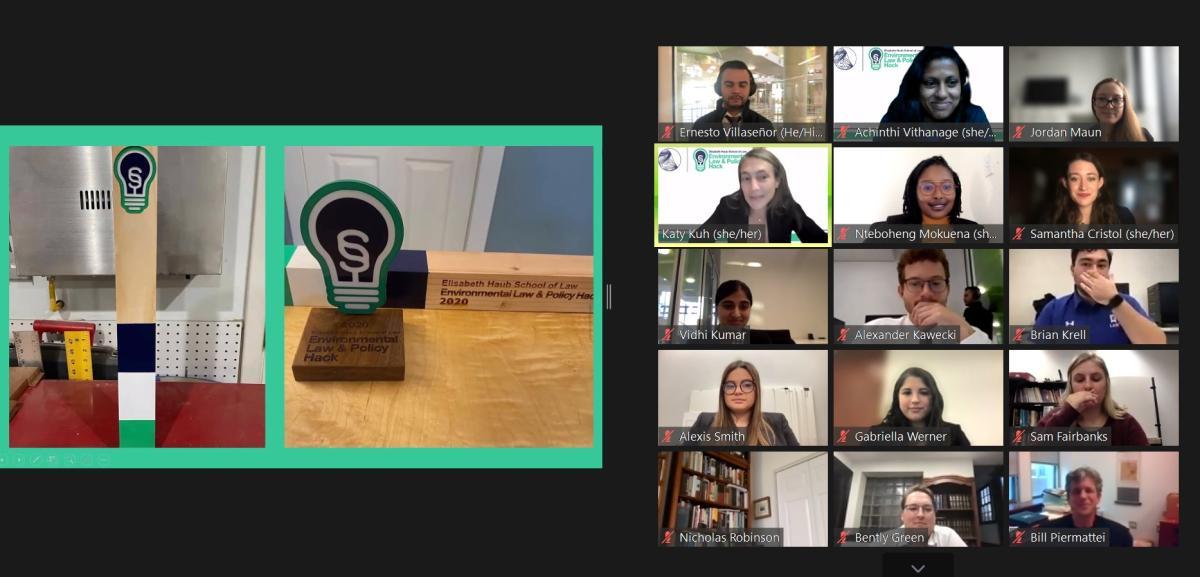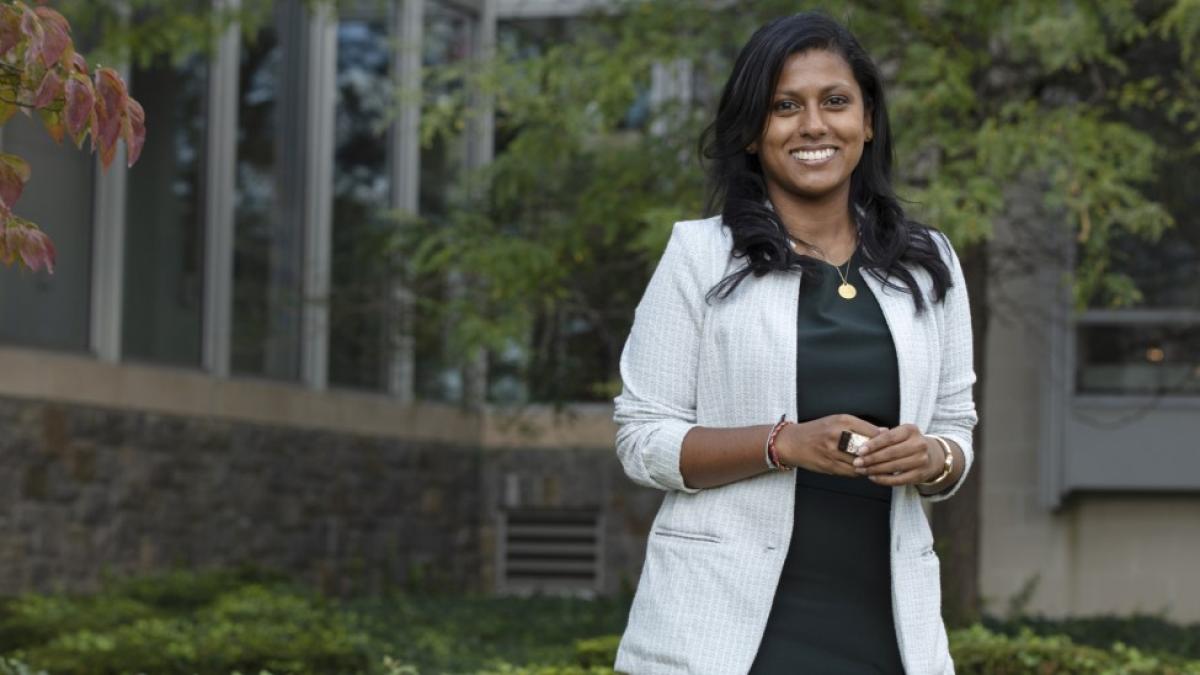
University of Miami School of Law team wins second annual Elisabeth Haub School of Law Environmental Law and Policy Hack Competition

A team of students from University of Miami School of Law won the second annual Elisabeth Haub School of Law Environmental Law and Policy Hack Competition.
The students, Samantha Cristol, Jordan Maun, and Nteboheng Mokuena, won a $2,000 prize that goes toward implementation of their proposal to mitigate nutrient pollution from nitrogen and phosphorus in the Biscayne Bay in South Florida. Addressing a host of challenges, including agricultural fertilizer overuse, wastewater system deficiencies, and stormwater runoff, their proposal calls for policy and enforcement changes on both regional and municipal levels for nutrient reduction and management, as well as the creation of community education programs.
Three teams were chosen as finalists for Haub Law’s 2021 Environmental Law and Policy Hack Competition, an environmental law and policy problem-solving event that invites students to propose an innovative and practical response to a current environmental challenge and awards seed funding to support implementation of the winning concept.
Two other teams along with the University of Miami School of Law team were selected as finalists by a panel of Pace faculty: The University of Baltimore School of Law team, Brian Lee Krell, Ernesto Villaseñor, Jr., Alexander Kawecki, Nicholas R. Nelson, Vidhi Kumar, Katherine Jeffreys, James Duffy, Bently Green, Sr., and Bently Green, Jr, who proposed an expansion of Maryland’s manure transport program following an analysis of poultry operators in the state to protect Maryland’s Eastern Shore and the University of Maryland Francis King Carey School of Law team, Samantha Fairbanks, Alexis Smith, and Gabriella Werner, who proposed riparian buffer conservation easements in the Shenandoah Valley to protect the Chesapeake Bay from nutrient pollution.
“For the second year in a row, the chosen finalist teams, which included several 1L students, were all very impressive in the breadth of their knowledge of their target communities and the impact that innovative local level responses can have on environmental law, policy and politics,” said Haub Law Professor Katrina Fischer Kuh, who organized the competition.
“Each of the submitted proposals would bring great benefits to their chosen water resource and the local communities that rely on them. They would also provide a useful model for nutrient pollution prevention beyond their chosen water bodies, on a more broad scale.”—Haub Law Professor Katrina Fischer Kuh, JD
Law students around the country were challenged to select a specific water body (or watershed), identify potential sources of nutrient contamination and recommend strategies for reducing nutrient contamination in the identified water body and also identify plans, policies, laws, or financial initiatives to carry them out. The virtual presentation of team proposals and the announcement of the winner took place on November 19. “My heartiest congratulations to all the finalist teams, whose performances, level of research, and understanding of the pertinent issues were truly impressive. I hope to see some of these proposals take shape and bear fruit in the near future,” said Professor Achinthi Vithanage, Associate Director of Environmental Law Programs at Haub Law.
This competition is intended to orient law students toward the development of practicable environmental policy; encourage students to collaborate with policy stakeholders, including from government and the community; catalyze the conceptualization and implementation of innovative solutions to pressing environmental problems; and further our commitment to advancing environmental protection.
The final-round judges who chose the winner were Professor David Kanter, Associate Professor of Environmental Studies at New York University and Vice-Chair of the International Nitrogen Initiative; Professor Sarah Matsumoto – Associate Professor of Clinical Education at Williamette University College of Law; Attorney Peter Lehner, Managing Attorney and Director of the Sustainable Food & Farm Program at Earth Justice; and Professor Margot Pollans at Haub Law and Director of Pace | Haub Law’s Food Law program. “The judges were particularly impressed by the ambitiousness of the winning team’s proposal and its integration of equity issues in a very meaningful way,” remarked Professor Margot Pollans who delivered the judges’ verdict.

Last year, a team of students from Drake Law School won the first annual Elisabeth Haub School of Law Environmental Law and Policy Hack Competition.


